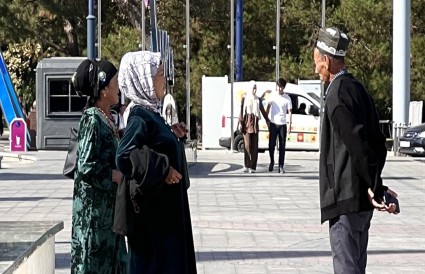The AI Technologies Development Strategy 2030, adopted in October last year includes an item on the national model of AI in Uzbekistan. Head of the Department of the Ministry of Digital Technologies Sarvar Sadullaev and Acting Executive Director of the Central Asian Association of AI (AICA) Hikmatilla Ubaydullaev explained what is meant under the national AI model and why it is needed.
The country took its first steps towards AI in 2021. On October 14 last year, a presidential decree was issued approving the Strategy. Sarvar Sadullaev said that one of the first steps in the implementation of the Strategy was that ministries and departments whose activities have already been digitized were given directives to provide the Ministry of Digital Technologies with data registers.
“Thus, the first stage includes collecting data in the Uzbek language. These can be literary, analytical texts, images, as well as anonymized medical data (for example, MRI and PET/CT) for further use in early disease diagnostics projects. This data will be stored in raw format and will be subject to further categorization. After that, datasets suitable for machine learning will be formed on their basis,” said Sarvar Sadullaev.
According to him, negotiations are underway with labeling experts. This process will be the next step after collection. The ultimate goal is to create an Uzbek national language model that will be able to work with texts, images, and specialized data in the Uzbek language.
Sarvar Sadullaev also said that more than 20 projects have already been initiated to implement AI in the healthcare sector. A small GPU cluster was brought in for their implementation, and a large cluster is planned to be launched in 2026, which will allow up to 100 projects in various industries to be implemented.
According to Sadullaev, one of the key objectives of the national model is to preserve historical and cultural accuracy in the digital environment.
“In some countries, Amir Temur is a hero, in others, an anti-hero. Global language models such as ChatGPT may not know certain facts about Uzbekistan or provide distorted information. The national model will eliminate such errors and consolidate knowledge that Uzbekistan considers correct, including history, traditions, famous personalities, and language features,” the expert noted.
The representative of the Ministry of Digital Development emphasized that historical and cultural materials will be used to train the model, including unique local data that is known only in Uzbekistan. This data is also planned to be transferred to large LLM (large language model) developers so that the point of view of Uzbekistan is also taken into account when training new versions of global models.
Hikmatilla Ubaydullaev added that ChatGPT was unavailable to users from Uzbekistan for a long time - access was opened only in 2023, after which interest in AI increased significantly.
“However, even when working with modern tools, distortions arise: for example, when generating images for the query “Uzbek”, the model often creates a stereotypical or alien image - a man in a beard and a skullcap, a woman in a veil. This is due to the lack of sufficient data on Uzbeks and Uzbekistan,” the expert explained.
He emphasized that without a national data set, it is impossible to achieve an accurate representation of culture, appearance and everyday life. According to Ubaydullaev, many different people with different appearances live in Uzbekistan, and the model must take this into account.
“If we write “Samarkand, Registan”, now the AI more or less understands what it looks like. But before that, there were problems, and that is why we are collecting our own data,” he added.
Sarvar Sadullaev also noted that the development of our own model is also important from the point of view of technical application: from translation and speech recognition to automatic compilation of medical protocols, call center conversation scripts and work with clients in the banking sector. The national language model should become a universal tool that "will help develop all areas from within."
Khikmatilla Ubaidullaev added that the state is creating conditions in which the private sector will be able to reduce the cost of implementing AI.
"Unlike renting foreign servers, which costs 10-20 thousand dollars a month, in Uzbekistan the capacities will be local, which means cheaper due to the internal TAS-IX traffic. This is especially important for startups and small companies," the expert added.
Ubaidullaev emphasized that a local language model is necessary for working with confidential information in government agencies. According to him, this will reduce dependence on external suppliers.
The expert stressed that the more Uzbeks communicate with AI in their language, the faster the models learn. Uzbekistan is not just catching up with the global market — it is striving to take a stable and independent place in it, building an architecture of digital independence based on national interests. In the countries of the region — Kazakhstan, Tajikistan — work is also underway to create their own models.














